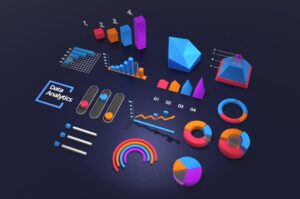Artificial Intelligence (AI) has emerged as one of the most transformative technologies of the 21st century, fundamentally altering the way we interact with machines and process information. At its core, AI refers to the simulation of human intelligence in machines that are programmed to think and learn like humans. This encompasses a wide range of capabilities, including problem-solving, understanding natural language, recognizing patterns, and making decisions.
The rapid advancements in machine learning, neural networks, and data analytics have propelled AI from theoretical concepts into practical applications that permeate various sectors of society. The evolution of AI can be traced back to the mid-20th century, when pioneers like Alan Turing and John McCarthy laid the groundwork for what would become a burgeoning field of study. Today, AI is not merely a subject of academic interest; it is a driving force behind innovations that enhance efficiency, improve decision-making, and create new opportunities across industries.
From virtual assistants like Siri and Alexa to sophisticated algorithms that power autonomous vehicles, AI is reshaping our daily lives and the global economy. As we delve into the specific applications of AI across various sectors, it becomes evident that its potential is vast and largely untapped.
Key Takeaways
- Artificial Intelligence (AI) is a rapidly advancing technology that aims to simulate human intelligence in machines.
- AI in Healthcare has the potential to revolutionize patient care, diagnosis, and treatment through predictive analytics and personalized medicine.
- AI in Finance is transforming the industry with automated trading, fraud detection, and risk assessment, leading to more efficient and accurate decision-making.
- AI in Transportation is driving innovation with self-driving vehicles, traffic management systems, and predictive maintenance, improving safety and efficiency.
- AI in Manufacturing is optimizing production processes, quality control, and supply chain management, leading to increased productivity and cost savings.
- AI in Customer Service is enhancing customer interactions through chatbots, virtual assistants, and personalized recommendations, improving satisfaction and efficiency.
- AI in Marketing is revolutionizing targeted advertising, customer segmentation, and campaign optimization, leading to more effective and personalized marketing strategies.
- The future of AI in industries is promising, with continued advancements expected to drive innovation, efficiency, and transformation across various sectors.
AI in Healthcare
The integration of AI in healthcare has revolutionized patient care and medical research, offering unprecedented opportunities for improving outcomes and efficiency. One of the most significant applications of AI in this field is in diagnostic imaging. Machine learning algorithms can analyze medical images such as X-rays, MRIs, and CT scans with remarkable accuracy.
For instance, Google’s DeepMind developed an AI system that can detect over 50 eye diseases by analyzing retinal scans, achieving performance levels comparable to that of expert ophthalmologists. This capability not only speeds up the diagnostic process but also reduces the likelihood of human error, ultimately leading to better patient outcomes. Moreover, AI is playing a crucial role in personalized medicine.
By analyzing vast amounts of genetic data, AI algorithms can identify patterns that help tailor treatments to individual patients based on their unique genetic makeup. For example, IBM’s Watson has been utilized to analyze cancer patients’ medical records and genomic data to recommend personalized treatment plans. This approach not only enhances the effectiveness of treatments but also minimizes adverse effects by ensuring that patients receive therapies that are most likely to work for them.
The potential for AI to transform healthcare is immense, as it continues to evolve and integrate with other technologies such as telemedicine and wearable health devices.
AI in Finance

In the finance sector, AI has become an indispensable tool for enhancing efficiency, managing risk, and improving customer experiences. Financial institutions are increasingly leveraging machine learning algorithms to analyze market trends and make data-driven investment decisions. For instance, hedge funds like Renaissance Technologies utilize complex algorithms to identify trading opportunities that human analysts might overlook.
These algorithms can process vast amounts of data at lightning speed, allowing firms to execute trades with precision and capitalize on fleeting market conditions. Risk management is another area where AI has made significant strides. Financial institutions employ AI-driven models to assess credit risk more accurately by analyzing a broader range of data points beyond traditional credit scores.
Companies like ZestFinance use machine learning to evaluate borrowers’ creditworthiness by examining factors such as online behavior and social media activity. This not only enables lenders to make more informed decisions but also expands access to credit for individuals who may have been overlooked by conventional methods. As AI continues to evolve in finance, its ability to enhance security through fraud detection systems is also noteworthy; algorithms can identify unusual transaction patterns in real-time, significantly reducing the risk of financial fraud.
AI in Transportation
| Metrics | Value |
|---|---|
| Reduction in accidents | 20% |
| Improvement in traffic flow | 15% |
| Reduction in fuel consumption | 10% |
| Enhanced vehicle autonomy | Level 4 |
The transportation industry is undergoing a profound transformation due to the advent of AI technologies, particularly in the realm of autonomous vehicles. Companies like Tesla and Waymo are at the forefront of developing self-driving cars that utilize advanced machine learning algorithms and sensor technologies to navigate complex environments safely. These vehicles rely on a combination of cameras, radar, and lidar to perceive their surroundings and make real-time decisions based on data inputs.
The potential benefits of autonomous vehicles include reduced traffic accidents caused by human error, increased fuel efficiency, and enhanced mobility for individuals unable to drive. Beyond personal transportation, AI is also optimizing logistics and supply chain management. Companies such as Amazon employ AI algorithms to streamline their delivery processes by predicting demand patterns and optimizing routes for delivery trucks.
This not only reduces operational costs but also improves customer satisfaction by ensuring timely deliveries. Furthermore, AI-driven predictive maintenance systems are being implemented in public transportation networks to monitor vehicle performance and predict failures before they occur. By analyzing data from sensors embedded in vehicles, these systems can schedule maintenance proactively, minimizing downtime and enhancing service reliability.
AI in Manufacturing
Manufacturing has been significantly transformed by the integration of AI technologies, leading to increased productivity and efficiency on the factory floor. One prominent application is predictive maintenance, where AI algorithms analyze data from machinery sensors to predict when equipment is likely to fail. This proactive approach allows manufacturers to schedule maintenance before breakdowns occur, reducing downtime and saving costs associated with unplanned repairs.
For example, General Electric employs AI-driven predictive maintenance solutions across its manufacturing facilities, resulting in substantial savings and improved operational efficiency. Additionally, AI is enhancing quality control processes in manufacturing environments.
In contrast, AI-powered computer vision systems can inspect products at high speeds with remarkable accuracy. Companies like Siemens have implemented such systems to detect defects in real-time during production processes. By automating quality control, manufacturers can ensure that only products meeting stringent quality standards reach consumers while minimizing waste and rework costs.
AI in Customer Service

Enhancing Customer Satisfaction
Companies like Zendesk offer AI-powered chatbots that can engage with customers 24/7, providing instant responses to frequently asked questions or guiding users through troubleshooting processes. This not only enhances customer satisfaction by reducing wait times but also allows human agents to focus on more complex issues that require personal attention.
Gaining Valuable Insights
Sentiment analysis powered by natural language processing (NLP) enables businesses to gauge customer emotions based on their interactions across various platforms. By analyzing customer feedback from social media posts or online reviews, companies can gain valuable insights into customer preferences and pain points.
Personalized Experiences
This information can inform product development strategies and marketing campaigns tailored to meet customer needs more effectively. As AI continues to evolve in customer service applications, its ability to provide personalized experiences will likely become even more sophisticated, further enhancing customer engagement.
AI in Marketing
In the realm of marketing, AI has emerged as a powerful tool for optimizing campaigns and enhancing customer engagement strategies. One notable application is predictive analytics, where machine learning algorithms analyze consumer behavior data to forecast future purchasing trends. Companies like Netflix utilize these insights to recommend content tailored to individual users based on their viewing history and preferences.
This level of personalization not only increases user satisfaction but also drives higher engagement rates. Moreover, AI-driven tools are revolutionizing digital advertising by enabling hyper-targeted campaigns that reach specific audiences with precision. Platforms like Google Ads leverage machine learning algorithms to optimize ad placements based on user behavior patterns and demographics.
This ensures that marketing messages resonate with the right audience at the right time, maximizing return on investment for advertisers. Additionally, natural language processing allows marketers to create more engaging content by analyzing successful messaging strategies across various channels. As businesses continue to harness the power of AI in marketing efforts, the potential for creating meaningful connections with consumers will only grow.
The Future of AI in Industries
As we look toward the future, it is clear that artificial intelligence will continue to play a pivotal role across various industries, driving innovation and reshaping traditional business models. The ongoing advancements in machine learning algorithms and data analytics will enable even greater levels of automation and efficiency in sectors ranging from healthcare to finance and beyond. The potential for AI to enhance decision-making processes through data-driven insights will empower organizations to respond more effectively to market demands and consumer preferences.
However, with these advancements come challenges that must be addressed responsibly. Ethical considerations surrounding data privacy, algorithmic bias, and job displacement will require careful navigation as industries increasingly adopt AI technologies. Collaborative efforts between technologists, policymakers, and industry leaders will be essential in ensuring that the benefits of AI are realized while mitigating potential risks.
As we embrace this technological revolution, the future of industries powered by artificial intelligence holds immense promise for creating a more efficient, innovative, and equitable world.
Artificial Intelligence has come a long way since its inception, drawing inspiration from various fields of study. One interesting article that delves into the history of philosophy and its impact on modern technology is Exploring the Thinkers of Ancient Greek Philosophy. This article discusses the influential ideas of philosophers such as Thales, Pythagoras, and Heraclitus, whose theories on the nature of reality and existence continue to shape our understanding of the world today. By examining the roots of philosophical thought, we can gain a deeper appreciation for the complexities of Artificial Intelligence and its potential for future advancements.





















+ There are no comments
Add yours